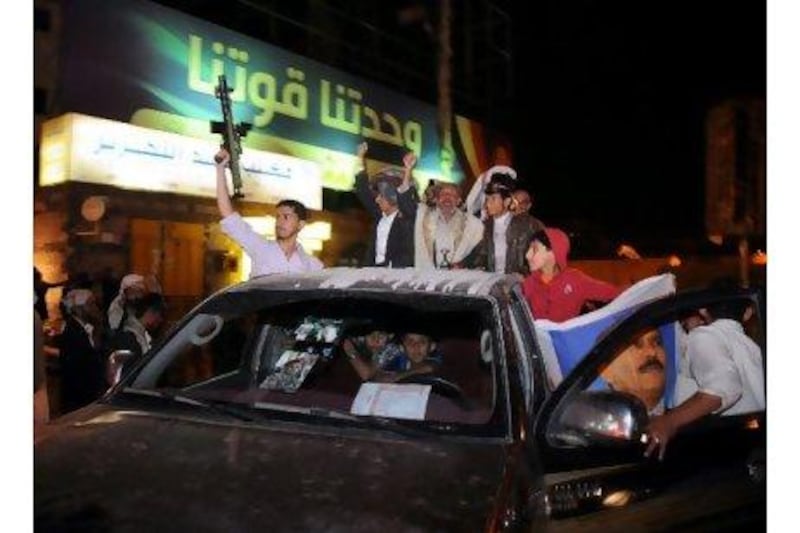SANAA // At least 11 people were killed in Yemen when president, Ali Abdullah Saleh's supporters opened fire after his first television appearance since he was injured in an assassination attempt.
Most of the shooting was in celebration of Mr Saleh's address on Thursday evening, hospital officials said, but it was unclear if all the deaths were accidental.
Five people died from gunshots in the capital, four in the city of Ibb, and at least two others elsewhere. However, Ahmed Akeel, a protest activist in Ibb, said four people were killed and up to 200 wounded in an attack by government supporters yesterday.
Mr Saleh has been receiving treatment in Saudi Arabia since a June 5 attack on his palace. In his address, he said he was ready to share power within the constitution's framework but that protesters had an "incorrect understanding of democracy".
Mr Saleh has been under international pressure to resign. He backed out on three occasions from signing a plan brokered by the Gulf Co-operation Council in which he would step down. Under the plan, the vice president would formally take power, a unity government would be formed with the ruling and opposition parties and elections would be held within two months.
The United States and Saudi Arabia are pressing for the revival of a modified GCC agreement which was signed by the main opposition coalition and even ruling party representatives in May.
Yesterday, opposition and youth protest leaders dismissed Mr Saleh's brief television appearance as tired rhetoric and demanded he step down from office immediately.
"His appearance shows that he can sign the GCC initiative, he should hurry up to sign the deal and any talk out of this context is a waste of time," said Mohammed Qahtan, a spokesman of the main opposition coalition, the Joint Meeting Parties.
Tarik Al Shami, the spokesman of the ruling General People's Congress, said Mr Saleh's appearance came as a surprise to the opposition and showed the president was still able to lead.
"The president has demonstrated that he is in full mental presence and this has shocked the opposition," Mr Al Shami said.
Nearly six months of anti-government protests attended by hundreds of thousands have left Mr Saleh clinging to power.
Defections by key allies - including some high-ranking military officers - and international pressure have failed to make him resign.
Khalid Al Anisi, a leader in the protest movement, said Mr Saleh's TV appearance was a "challenge" and it showed he would never voluntarily step down.
"It is a declaration of war and an attempt in which he is trying to regroup his supporters . . . this speech has proved that there is no option but to bring the regime down through intensifying peaceful protests," said Mr Al Anisi.
Ali Saif Hasan, the director of the Political Development Forum - a Sanaa based non-governmental think tank, said Mr Saleh's television appearance, in which he was unable to move his hands and legs, might win him sympathy with the public.
He said it "will force the opposition either to play new cards or accept the offer of sharing power with the regime of Saleh".
malqadhi@thenational.ae





